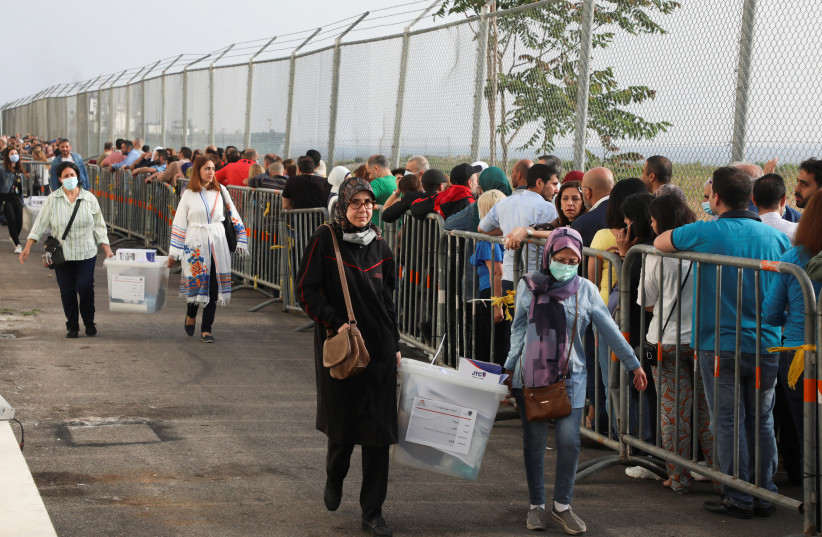Hezbollah terrorists this week suffered a setback in Lebanese elections which carry the potential to see power shift significantly in Beirut. It is important to highlight the fact that moderates and reformers can triumph over extremists, but also to be clear that the final outcome may be that Hezbollah uses this as an excuse to stir up tension in the Middle East.
Overnight on May 16, a day after the elections, the IDF said it identified and downed a drone belonging to Hezbollah. That means the terrorist organization that stockpiles masses of weapons illegally decided to fly a drone into Israeli airspace after having learned that its allies didn’t perform as well as anticipated in elections. Is there any greater indication that the country has been hijacked by a vicious terror group and that Lebanon has no control over that group?
The final votes are still being counted in Lebanon but estimates show that Hezbollah and its allies will not have a majority. That could mean Hezbollah and its friends in parliament will be reduced from some 71 seats out of 128 to 60 seats. Time will tell.
What does matter is that opponents of Hezbollah seem to have done well. Samir Geagea’s party may have won 20 seats. This is a defeat for the Christian parties that are pro-Hezbollah. Hezbollah has controlled Lebanon in the last decade and a half by co-opting Christians. Hezbollah pretends to defend Lebanon from extremists like ISIS and it sold itself as better for the country than traditional Sunni or other allies of the powerful Christian parties.
The tragedy of Lebanon is that a small group like Hezbollah was able first to co-opt fellow Shi’ites and then Christians, Druze and others. Hezbollah has some 100,000 missiles. It has brought poverty and destruction to Lebanon and threatens Israel for no reason. Were it not for Hezbollah, and before them the Palestinian terror groups that took root in Lebanon in the 1960s, Lebanon and Israel and other successful countries in the region could all be friends. But Hezbollah hijacked Lebanon, pretending to “resist” Israel and becoming a tool of Iran. In fact, after Syria was forced to leave Lebanon after Hezbollah murdered former Lebanese Prime Minister Rafik Hariri, the group launched a war against Israel in 2006. Then it fought with anti-Hezbollah factions and launched a wave of assassinations. It kills authors and intellectuals and anyone who stands in its way.

There are reformers in Lebanon – politicians and activists who seek a different path. The new parliament may have more of them then it does members of Hezbollah. But Hezbollah will do whatever it can to weaken them, and it may even target them for assassination.
UN Secretary-General Antonio Guterres has called on Lebanon to form an “inclusive government” and to tackle the country’s economic crisis. Considering how the UN often pays only lip service to these issues, it is unclear who will actually support Lebanon now that reformers have a chance to change the country’s trajectory.
There could be clouds on the horizon. The drone incident shows that Hezbollah continues to do whatever it wants in southern Lebanon and it may use the election to heat things up with Israel so that it can pretend to be “defending” Lebanon.
The weakening of the Christian allies of Hezbollah, especially Gebran Bassil’s Free Patriotic Movement Party, means that Hezbollah can’t use the Christians as a shield for its nefarious business. This will anger the regime of Bashar al-Assad in Damascus, which also counts on its friends in Lebanon. The Assad regime needs a compliant Beirut. It traffics drugs through Lebanon and then onward to pro-Iran militias that move the drugs throughout the region. It also traffics money and other goods through Beirut to avoid sanctions.
In southern Lebanon there are stirrings of opposition to Hezbollah. Opposition candidate Firas Hamdan is likely to take a seat in parliament.
There is now hope in Beirut, if the reformers can win the peace.
